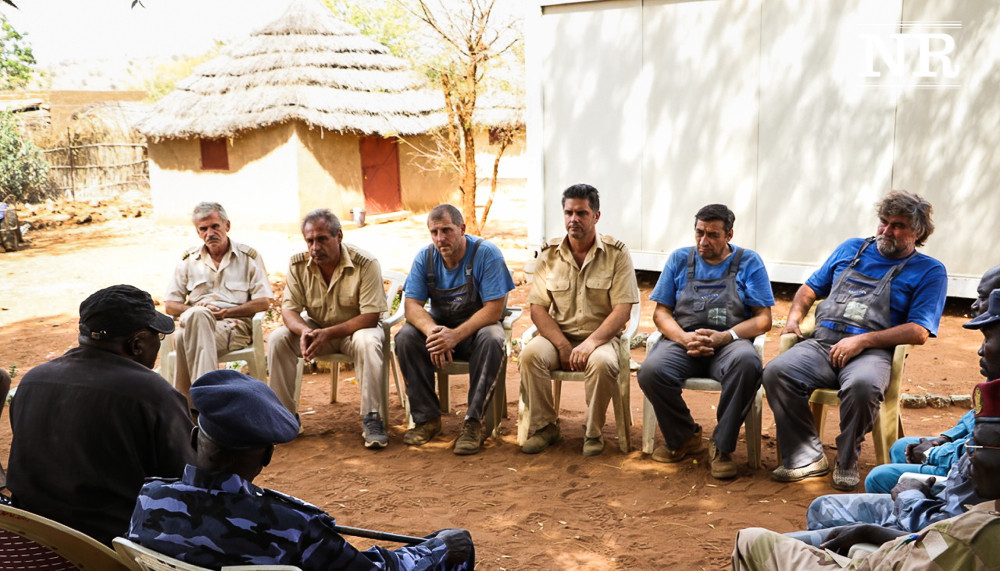*Nuba Reports provided footage and reporting to Reuters for the above video.*
Lubomir Gelev, the captain of a UN helicopter forced down by SPLA-N rebels had no idea he was flying over a war zone. text
In the previous two weeks the area underneath his Russian made helicopter had seen the bloodiest and largest battles between the rebels and the Sudan government since the forgotten conflict had started in 2011. A full scale offensive using tanks, Mig Fighter jets, and hundreds of technicals against the rebels had just been repelled only days before Gelev was cleared to fly.
The Bulgaria-born helicopter captain is on contract with the World Food Program (WFP), and on January 26, he was flying the officially prescribed flight path from his base in South Sudan to Khartoum for routine maintenance on the aircraft, when it was shot down by the SPLA-N.
“We have no idea what happened exactly,” he said grimly, “but we know the consequences.”
Arnu Lodi, the SPLA-N spokesman said that the rebels had no idea that anything but government bombers and attack planes flew over the front line air space that his army carefully monitored. “The aerial bombardment is on a daily basis,” he said “all types of fighting aircrafts are being used against the people of the Nuba Mountains, especially in these months.” In December alone 450 bombs were dropped on the region.
This has been the most active and violent fighting season on record between the government and the rebel SPLA-N, although the original lines of combat have barely shifted since the start of the government-declared “Decisive Summer” campaign. At least 10,000 have been displaced in this fighting season – pushed out by fighting and near constant aerial bombardment on military and civilian targets. Just last week an MSF clinic was bombed for the second time forcing the organization to pull out.
Seeing the helicopter in the sky, the SPLM-N unit responded, shooting down the helicopter. Lodi claims the army assumed it was affiliated with the enemy. “The plane was shot by mistake,” he said.
According to Gelev, somewhere over the border of South Sudan he felt the helicopter “kick” and saw the oil pressure fall, fast. Gelev tried to deviate the plane to Kadugli, the nearest town, but the pressure was dropping too quickly and oil was leaking inside the cabin, so he made an emergency landing into rebel held territory.
Gelev thought the nearly fatal problem that caused the emergency landing was a technical issue, but when the crew got out of the plane and on to the ground, they saw they’d been hit by a bullet. One of the blades was almost broken, and oil had been leaking into the cabin because the reservoir that directly powers the engine was hit with shrapnel.
Remembering, he laughed “I think they were lucky to hit us.” The aircraft was flying extremely high, above the safety altitude recommended by the WFP.
Before they could more closely identify the damage, SPLA-N soldiers descended, taking the men and all their belongings. Gelev recalls that about after an hour someone who appeared to be in higher command arrived.
The crew was detained for almost two days until WFP in Rumbek, South Sudan confirmed that the crews claims on their business in the region. On the afternoon of the 28th, the men were released and driven to a civilian area and put up at an old NGO compound.
A seasoned pilot with experience in Darfur and South Sudan, Gelev is baffled that the official flight route on every aviation map is over this isolated war zone that no one – even people working in the same country – seems to know about. His company, Heli Air Services has been operating in Darfur for ten years.
The government in Khartoum and aviation authorities gave him permission to travel. Gelev gets regular security updates before he flies around Darfur and South Sudan. “We get so much information from Darfur, where is dangerous, where we have to avoid, the same in South Sudan.” The government army in South Sudan updates a safety map every three days.
In South Kordofan he knew there had been fighting around the secession, but thought it has finished “a long time ago.”
He pondered, “Can you imagine any other aircraft coming from South Africa to Egypt for example, a helicopter that is going to pass through this [war torn area] how would they know in South Africa there is this? Or somebody from Europe?”
After confirming the men worked for WFP, the rebels invited the organization to fly up a helicopter to pick them up. Meanwhile WFP staff scrambled to get permission to from the Sudan government to bring in a helicopter to fly then out. The Sudan government blamed the rebels for the incident, and did not recognize the SPLA-N claims to control territory.
On Thursday the Bulgarian company Heli Air that contracted the helicopters to the UN said that the crew would be leaving on Friday the 30th at the latest. But negotiations continued with the Sudan government and the UN. On Friday the civil administration decided the best path was to secretly drive the crew across the border into South Sudan where they could be picked up by WFP.
“The SPLA-N’s intention was to ask to allow a [UN] plane to come and collect the Bulgarian crew.” said Iqram Mahmoud the social development officer for Nuba Women’s Association. “Unfortunately the Sudanese government prevented the plane from entering this area so the local government officials decided to take them by road to Yida.” Her organization then volunteered to send a convoy to South Sudan with the crew.
On Sunday morning the WFP confirmed that the crew had arrived in Yida, the South Sudan refugee camp where 70,000 people who have fled the conflict live.





